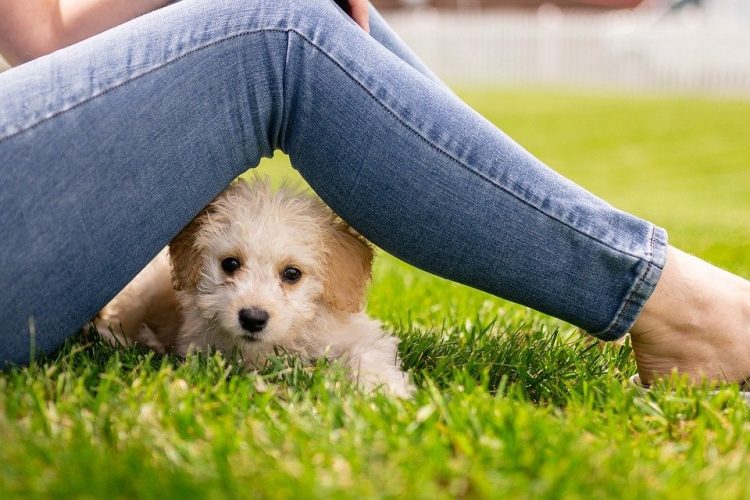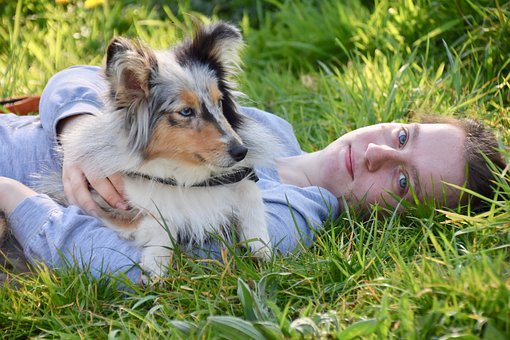Why Do Dogs Lay on Your Feet – Here’s 8 Reasons!
If you are a dog owner, you might experience instances when they do not want to leave your side. Whether you’ve stopped your walk to take a short break on a park bench or you are lounging around watching television, your dog is probably right there beside you.
In most cases, your pup will choose to sit on your feet. If you do not get up, they will eventually transition to laying down, and sometimes they even sleep on your feet.
While this behavior is not necessarily bad, it can become annoying for a dog owner. If you have invested in a quality dog bed for a pet who chooses to sleep on the floor or by your feet, you might agree. You should not forget; however, that there are instinctual reasons behind most of the things your pup does.
Our furry mates are always devoted to us, and they can show their love in a wide range of ways throughout the day. Their actions often say a lot about how they feel and come from deeply rooted reasons dating back to the wild dog. Whether you love it or not, it is good to understand your dog’s habits.
There are many reasons why your pup might love laying at your feet. The reasons can range from being affectionate to instinct. So why do dogs lay on your feet? This article shares eight common reasons behind this behavior by taking a deeper look at what causes your dog to follow you around and keep your feet company.
1. Canine Instinct

A dog is a pack animal. Even if your seemingly spoiled canine companion has never spent time out in the wild, the behaviors are still ingrained in them. In most instances, the act of lying on your feet is simply a remnant of their ancestral DNA.
In the wilderness, dogs travel and live in packs. They often do this to keep themselves protected and to combine their efforts to survive.
Whenever they stop to rest, their leader finds the most comfortable spot while the rest of the pack sleeps close for warmth and safety. In your home, you are your dog’s pack leader.
Young pups learn about pack instincts and mentality at a very early age. They can learn to sleep under their mother’s tails. This helps to avoid being hurt in case their mother rolls over in her sleep. If you have a newborn canine, they can still exhibit this behavior because it is all they know. It can also be a sign of respect and devotion to you as the leader of their pack.
2. Safety
Why do dogs lay on your feet? As the alpha of your household, you wear many hats in the eyes of your canine companion. They see you as their pack leader, thus being a superhero in their eyes. They trust you to take good care of them. They also believe that you will protect them when need be.
If your dog feels insecure about something, it will go to you for protection. This is especially true for the submissive pups. Even the larger and most intimidating breeds; however, will come to you if they feel unsafe.
Dogs often get anxious because of new people, loud sounds, and other things they are not used to. They will lay or sit at your feet to gain comfort. In some cases, it only takes a touch to make your furry friend feel safe.
If your dog sleeps on your feet, pay close attention to how they are sleeping. If they sleep on their side, with your feet tucked underneath, they feel very comfortable. They are showing you that they are counting on you to keep them safe.
3. Territorial Behavior

Just as you see your pet as your own, they see you in the same light. Since you are their respected pack leader, your dog will often feel the urge to mark their territory to keep away other canines. Anytime you are out in public, your furry mate will always sit close, if not right on top of you.
Pups are extremely devoted to their owners. This action is their way of keeping you all to themselves. It is their way of complimenting how great a pack leader you are, and no other dog can claim you as their own.
4. Showing Dominance
Dogs can hop right into your lap or on your feet because they are thrilled to see you. It could also be one way of showing others that you are in charge. By sitting or lying on your feet, your dog also feels a sense of being in charge too. This is a behavior that you will often see when you bring new pets into your home.
5. Guarding the Pack
Why do dogs lay on your feet when they should be guarding you or your home? This is a very common question if you are a dog owner, and protection is the reason.
Dogs often look for protection from their owners, and they often feel inclined to protect them in return. You are an essential member of their pack, so they go above and beyond to offer you protection whenever they can. They lay on your feet to put themselves between you and any danger.
6. Affection
Your dog might sleep or lay at your feet because they love you. They expect to feel your touch, smell you, and hear you breathing. If you have been away all day, your canine companion may display this behavior because they have missed you and don’t want you to leave again.
Some pups will show signs of affection to comfort you. They are intelligent creatures that can pick up on your emotions quite easily. If you show signs of stress or are crying or sick, your pup might lay on your feet to comfort you or calm you down.
7. Seeking Warmth

Colder seasons are some of the reasons your furry friend might want to cuddle you for your body heat. This also ties into their old pack instinct, where the pack cuddles around their leader for warmth.
Some pups seek warmth more than others. Cuddling with you or laying on your feet is an invaluable way for them to find the warm comfort they desire. We can say they see you as their personal heated blanket.
8. Knowing Your Whereabouts
Over decades, dogs have become intertwined with their human companions. They tend to display a secure base effect similar to that in parent-child bonding. This means that just like children cling to their parents; dogs seek your presence for comfort, and they too can suffer from separation anxiety.
By laying on your feet, they know that they will be the first to know whenever you decide to switch positions or get up to leave the house. Being aware of where the owner is at all times is comforting to a devoted canine companion.
Should You Let Your Dog Sleep on Your Feet?
Regardless of what motivates them, if your dog wants to sleep on your feet, this is a habit you do not have to fret about. It is an entirely natural instinct for them and does not reflect anything negative.
Your dog laying on your feet can be a vital part of your bond. It is also a good moment to give your pup some love, time, and attention with a simple and satisfying scratch behind their ears.
If you realize that your dog suddenly wants to spend all their time laying on your feet, they might have suffered a notable scare. This scare might have reduced their confidence, and it can be a problem if they do not feel safe in their own home or a dog shelter.

The behavior might also become an issue if their protective or territorial mode turns into aggression. Your dog can start barking at others or even worse.
If that happens to your dog, you need to introduce additional socialization training. It will help them know how to properly respond to the presence of others.
Your pup might tend to take their behavior to excess by laying on your feet at the most inconvenient times. For instance, when you are preparing a meal, and you keep tripping over them as you move around the kitchen. You might have to discourage this behavior.
You can refrain from rewarding them any time they try laying on your feet and encourage them to move off your feet to a more appropriate location. Make sure to prepare a nice spot close to you because they lay on your feet to feel connected.
Final Thoughts
If there is a way for your dog to show just how much they respect and love you, it is through laying by or on your feet. By laying on your feet, they are telling you how good of a job you are doing at being their pack leader.
Unless the behavior is accompanied by undesirable actions, it is a normal and genuine way to show you that they care. If this behavior becomes extreme, you can discourage it gently without making them feel like they are being punished for natural behavior.

